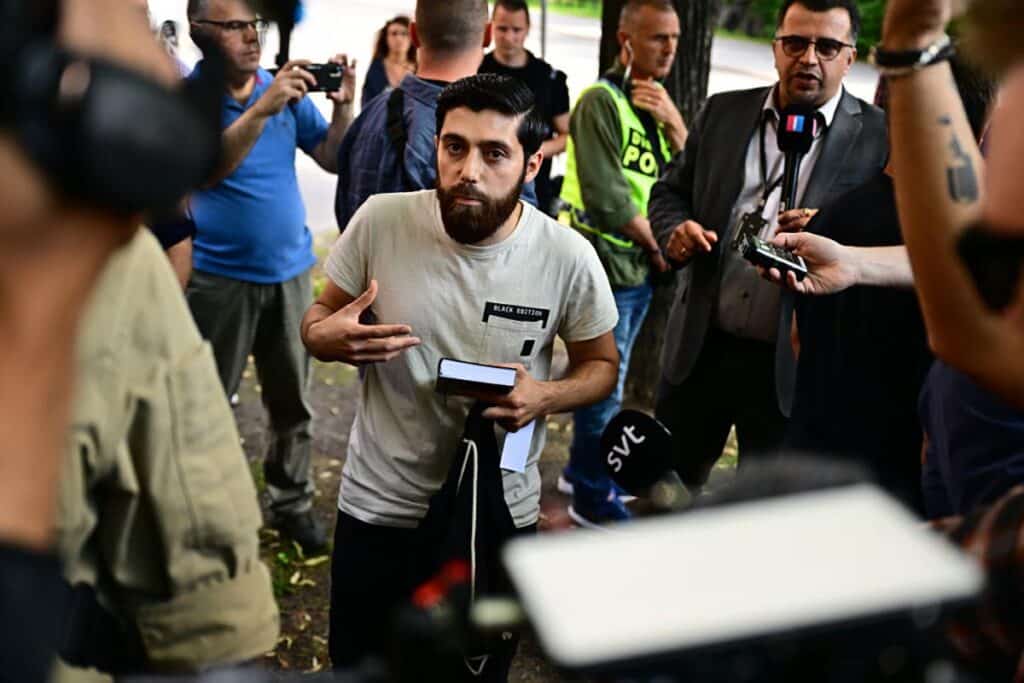Where do we draw the line with free speech? Most people would agree that yelling “fire” in a movie theater and publishing fake news crosses the line. But what about burning books, or more specifically, holy books?
It’s a complex issue and one that recently took center stage in Sweden. Last week, Swedish Police approved a request to allow the burning of a Torah and Christian Bible outside of the Israeli embassy in Stockholm.
Although the planned burning didn’t end up happening, it sparked an outcry from Israel and Jewish leaders around the world. So, this week we wanted to unpack what happened and ask: Should book burning be protected as free speech or banned as hate speech?
What happened with the planned book burning?
Muslim activist Ahmad Alush said he planned to carry this out “for the sake of freedom of speech.”
This came just weeks after Salwan Momika, an Iraqi Christian immigrant to Sweden, burned a Quran outside of a mosque in Stockholm. He claimed he wanted “to express [his] opinion about the Quran…This is democracy,” he said. “It is in danger if they tell us we can’t do this.”
#Sweden:
— Aceu (@AceJaceu) June 28, 2023
In Stockholm, Sweden, on the first day of Eid al-Adha, a person named Salwan Momika, of Iraqi origin, accompanied by police protection, burned the Holy Quran in front of a mosque.
Does Sweden have laws on hate crime or rabble-rousing?
pic.twitter.com/Su3uQIS3UC
The Israeli government, and Jewish and Christian leaders in Sweden all spoke out against the burning. When the Swedish government approved a similar burning of the Torah, it sparked further widespread condemnations.
Israeli President Isaac Herzog voiced his disapproval, saying: “Permitting the defacement of sacred texts is not an exercise in freedom of expression, it is blatant incitement and an act of pure hate.”
Former Israeli President Naftali Bennett agreed, saying in an interview on Swedish television:
“As an Israeli, as a Jew, I find it deeply disturbing to have the Torah burned. I myself as a man of faith, every day I pray, using the verses of the Torah. This is an affront to every Jew, every Israeli, and every human being.”
״שריפת ספר תורה היא שנאה והסתה, לא חופש ביטוי.
— Naftali Bennett בנט (@naftalibennett) July 14, 2023
כיהודי מאמין אני קורא בכל בוקר בתפילה פסוקים מהתורה שלנו.
אל תאפשרו זאת.״
– הראיון המלא שלי היום בטלוויזיה השוודית. צפו>> pic.twitter.com/Z6vgWsImt7
The next day, something unexpected happened. Alush, who had planned to burn the Torah outside the Israeli embassy, arrived without a Torah. Speaking to reporters who had gathered at the scene, he explained that his intention was never to burn holy books, but was instead to protest against the Quran burning.
“I want this to lead to a ban on burning all holy books. You can criticize and you can think one way or another, but you shouldn’t burn [holy books],” he said.

Jews around the world breathed a collective sigh of relief. But for many, the incident evoked memories of a painful history.
Burnings of Jewish books: A brief history
Although the history of book burnings isn’t limited to the Jewish community, some of the most notorious incidents have involved Jewish books.
Take June 17, 1242, in Paris, for example. At the command of the Pope and the French king, every known existing copy of the Talmud in Paris was burned. At the heart of this burning lay the accusation that the Talmud contained blasphemous material against Christianity. This event set a terrifying precedent in history.
In May 1933, one of the most infamous book-burning incidents took place: Nazi Germany’s incineration of 25,000 “un-German” works, many of which were authored by Jewish intellectuals.
Among the works burned were the writings of 19th-century German Jewish poet Heinrich Heine, who famously wrote: “Where they burn books, they will also ultimately burn people.”
He wrote it in reference to the Spanish Inquisition’s burning of the Quran — and it’s an absolutely chilling statement to hear today.
But, there were also times when Jewish people burned books – including Jewish books.
In the 12th century, Jewish leaders from the communities of Montpellier and Provence in France, set fire to the works of Moses Maimonides, better known as the Rambam. They deemed his philosophical interpretations of Judaism as too radical and a significant departure from tradition.
In 1945, Rabbi Mordecai Kaplan’s Sabbath Prayer Book was set ablaze by the Union of Orthodox Rabbis of the U.S. and Canada, as they excommunicated him for perceived heresy.
The Union viewed Kaplan’s attempt to reconcile Jewish practice with modern thought, embodied in his work, as a threat to the integrity of Jewish tradition.
This dramatic act at New York City’s Hotel McAlpin was part of a wider struggle within the American Jewish community over the interpretation of tradition and the rising influence of the Jewish Theological Seminary and Conservative Judaism. However, the move backfired, with the broader public rallying behind Kaplan and criticizing the Union.
Burning holy books: Freedom of expression or hatred?
The memories of historical Jewish book burnings complicate an already fraught debate, brought to life by the recent situation in Sweden.
So, is burning holy books an exercise of free speech — which should be protected — or a manifestation of hate speech that should be banned? Should countries permit such acts?
On one side, many argue that freedom of expression should be absolute. Why? Because the ability to express your views is a cornerstone of a democratic society.
If we start policing which ideas can or can’t be expressed, we risk sliding down the slippery slope of censorship. Who gets to decide which books are too dangerous, and which ideas are too harmful?
The other side argues that freedom of expression should have limits. Burning holy books is not just a symbolic act of dissent; it’s an act of aggression.
In their view, such acts are an attempt to delegitimize and dehumanize the people who revere those books. And allowing such acts can breed division and give a platform to hatred.
So, at the end of the day, where does that leave us? Here’s how we think about this complicated issue.
Even if there isn’t a law against burning holy books, it’s still wrong.
This principle is illustrated by the famous story in Bereshit/Genesis 4 in which Cain kills his brother Abel. Cain is severely punished for committing this act, even though he was never commanded not to murder.
The medieval commentator Ramban (Nachmanides) raised the question: If Cain was never commanded not to murder, how should he have known not to?
Ramban answers this question by introducing the concept of rational commandments. He posits that certain moral codes are so fundamental that they do not need to be explicitly prescribed by any authority, be it a prophet or a law. These principles are inherent in our human rationality, shaping what Ramban calls a “universal morality.”
The bottom line is that Cain, even in the absence of a commandment, should have known that murder was fundamentally wrong.
This concept isn’t exclusive to ancient texts or religious teachings. In fact, it can be found in many aspects of popular culture.
Take, for example, a moment from the 1967 film “Cool Hand Luke.” In one particular scene, a character attempts to justify his actions by saying, “I’m just doing my job.” In response, the protagonist, Luke, retorts, “Calling it your job don’t make it right, boss.”
A similar message can be found in Jonathan Haidt’s book, “The Righteous Mind,” where he presents a moral dilemma: A woman cuts up her old American flag to use as cleaning rags.
Despite this act being legal and unseen, the consensus among those Haidt asked was a gut feeling that it was morally wrong. This, Haidt argues, is a case of being “morally dumbfounded,” and it supports the idea of a universal morality that we intuitively understand.
Actions can be deplorable even if they’re technically permissible. So, even if there isn’t a specific law against burning holy books, according to the principle of universal morality, it should be recognized as a fundamentally wrong act.
The bottom line
From this standpoint, the act of burning books — particularly holy ones — is more than an issue of free speech. These books hold a deep sanctity to countless people.
When we burn these books, we are not simply setting fire to paper. We’re lighting a match to the intimate beliefs that others hold dear. Such an act sends a chilling message: “You and your beliefs aren’t welcome here.”
So, book burnings aren’t just about freedom of speech. It’s about the kind of world we want to live in — and whether we want that world to be one of division or one of respect.
